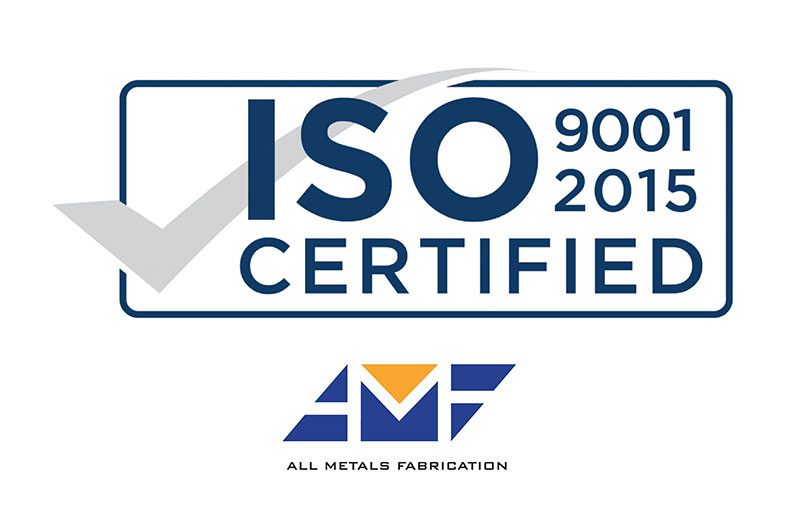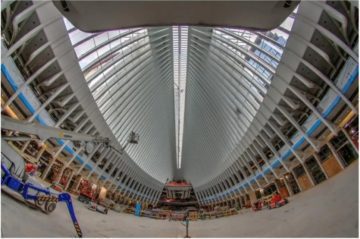
In late 2021, All Metals Fabrication’s (AMF) executive team made the decision to take our already steadfast, quality system and put an official ISO 9001 stamp on it.
The journey forward has been both empowering and challenging. Although it initially felt as if our arms had been twisted into starting the certification process, ultimately, we were pleasantly surprised by the experience. We found that it quickly became something we wanted to do, not something we had to do. It really fit our culture and management systems. In many ways, we found ourselves formalizing processes that, for the most part, were already well in place.
One component that made the certification empowering was our desire, as an executive team, to make sure that the company was building our own processes and systems. In other words, we did not want to open a book or hire a consultant to simply include favorite recipes and put token processes in place—we wanted to incorporate and utilize systems and processes that were specific to our company, culture and customers.
In short, our executive team wanted the ISO 9001 certification to be an outward signal that communicated our company’s genuine and internal commitment of doing the right things, the right way.
That journey became apparent when we were finally ready for official, third-party auditing. Our auditor, many times over, applauded the way we incorporated ISO standards into our already existing business processes. In fact, he commented that AMF’s ISO systems were some of the most original he had ever seen.
AMF’s commitment to quality and performance stands on four important Quality Management System (QMS) pillars:
These four quality objectives, of course, include many layers of important business functions, goals, services and KPIs that guide our work.
Several years ago, my wife and I went to a custom frame shop to order some large, custom-sized picture frames. My wife wanted to create an extensive display of family pictures on a large wall adjacent to the staircase in our front entrance—a beautiful, personalized display wall.
We spent an hour with a wonderful sales clerk who helped us decide shapes, sizes, materials and colors. We were excited with the finalized design. We set a date to pick up the custom-made frames and gave her a down payment for our expected goods.
I still recall the clerk negotiating a due date that would work for both my wife and her shop. She wrote the date down and circled it for emphasis on her company’s order form.
A few weeks passed and finally the date arrived to pick up the frames. My wife needed my help, along with my truck, to pick them up. I asked my wife, “Did you call to make sure the frames are done?” Her response, “No honey, I am sure they are done. The girl promised they would be done today!” I reluctantly agreed to go with her but in the back of my mind I was silently nervous, based on my own “job-shop experience” that the frames would not be done.
Of course, as we all know, the frames were not finished as promised. My wife was frustrated, angry and incredulous when we left, with sincere apologies from the framing company in hand—but no frames.
I, however, was far more sympathetic. I realized and knew from experience that on-time delivery in a job shop is not an easy thing. Good intentions abound, but the bulk of orders, dates, emergencies, mistakes, etc., make it extremely challenging for even the best companies to deliver successfully and consistently on time.
Excellent customer service is an oft-repeated theme in the business world—on-time delivery might be the best form of customer service imaginable.
How does this personal experience translate to delivering on time in metal fabrication?
Job-shop metal fabrication requires multiple processes and assemblies. Most of our parts include some form of laser cutting, either flat sheet laser or tube laser, deburring, forming, welding and finishing. Each of these general processes has their own subsets of microprocesses. For example, flat sheet laser cutting requires part programming, part nesting, machine setup time, machine run time, part checking, part stacking and part moving.
AMF utilizes a combination of ERP software and standard, bi-weekly meetings to discuss lead times, product flow, bottlenecks, potential challenges, lead times, etc. AMF had these processes in place before our ISO quest, but now we are adding metrics and feedback to track on-time performance at each workstation, recognizing that on-time delivery starts long before fabricated parts land on the customer’s dock.
Getting back to the picture frames story—I recognized that our sales clerk had every intention of delivering the completed frames on time. She wanted them done on time and she wanted delighted customers on the promised date.
For whatever reason, stuff happened—stuff happens everywhere and in every company. However, AMF is committed to unwinding that stuff and finding daily resolutions to maintain on-time delivery commitments.


AMF fabricated and manufactured an intricate “skeleton” of stainless steel angle parts that comprise the backbone of a very complex, geometrically-shaped building—New York City’s Transportation Hub.
AMF was selected as a sub-contractor on the job because we had the unique combination of architectural and manufacturing experience and expertise.
Yet even with our company’s experience, we were quite concerned that our components—with an incredibly complex and vast array of parts and pieces—would all be correct, including the fabrication and the labeling of the parts.
We knew that large cranes and big crews of manpower would be onsite to install everything. However, if any parts were wrong or mislabeled it would delay an enormously expensive team of construction workers and equipment, and potentially cost tens of thousands, if not hundreds of thousands of dollars, in delays and back charges.
Of course, with that type of pressure, AMF applied an all-hands-on-deck approach to every detail. Happily, the job was very successful and went forward without a hitch.
In some ways, this is an overly dramatic representation of parts needing to be done right and on time. On the other hand, it is not overly dramatic that our customers naturally expect their parts to be delivered correctly and on time, no matter the size of the job.
From a managerial philosophy, AMF strongly believes that our valued staff comes to work intent on doing a great and wonderful job. No one comes to work to deliberately mess up. Yet, we know people make mistakes—or better said—people use processes that let them down and allow for mistakes.
AMF already had processes and a culture in place that celebrated hitting the “all-stop” button when a problem was identified or something was not working. Reaching for ISO 9001 certification pushed our quality process controls and performance to even higher precision, which is exactly what we wanted.
As an organization, we cannot overstate how important it is to avoid rejected parts on our customers’ floors, but it goes much deeper than that. Inspecting quality to avoid sending bad parts is not enough. We reach deep into our processes to fabricate quality into our work. Ultimately, most would agree that inspecting for quality may be a safety net, but creating processes for quality is the launching pad for long-term, and, more importantly, sustainable success.
AMF is fiercely committed to this type of process control to keep our customers happy and to keep our bottom line black.
Our first two quality objectives, delivering on time and manufacturing high quality parts, are, without question, mainstays in manufacturing and business success. However, stating our intent that all business transaction be done profitably created quite a stir inside our organization. Could we announce to the world, particularly our customers, that we intended to transact our metal fabrication business profitably?
After lengthy discussions over a period of weeks, the executive team concluded that yes, AMF could and should make that a core pillar of our company’s ISO objectives and goals.
Corporate profits, particularly for very large businesses, seem to fall under wide-ranged scrutiny in today’s media and society in general. Politics aside, AMF’s executive team discussed at length that small businesses—the backbone of our economy—are much more vulnerable to downturns and cash deficits than large corporations who seem as if they could never fail.
To maintain a place of employment for all of our valued employees and to maintain a commitment to our customers to constantly and predictably perform to their expectations and requirements, AMF, ultimately, refused to shrink from the objective that our work must be done profitably—a goal that all small businesses work to accomplish—but not a goal that is typically stated in such an overt manner.
AMF will continue to work tirelessly and relentlessly to provide the best price we can for our customers. We will continue by investing in technology, best practices, training and trust. We will do that by never gouging, never taking advantage and never allowing short sightedness to cloud our judgment with long-term relationships.
We have nearly thirty years of track record to back these claims and recognize the profound trust it takes, even when including safety nets like contracts and purchase orders, to conduct business in a win-win relationship where both parties can be profitable and both parties can enjoy each other’s success.
All of this goes a long ways to reiterate that AMF is committed to a long-term future as we work profitably with our amazing customers.
Of the four objectives listed above, Continuous Improvement may very well be the very most important.
Ultimately, in life, and in the fabrication business, we are creatures, cultures and organizations that want to—and need to—get better. We must find a way to fight for improvement every single day.
AMF’s culture of continuous improvement is set deeply in the foundation of our company. In the last two years, AMF has received and implemented over one thousand improvement ideas. How do we do this?
Continuous improvement is a journey with no destination. By natural laws, it never has an end, it just goes and goes and goes—there is always something that can be done better; there is always a better, smarter, faster, more productive way.
This is more than a program for AMF—and it must be—it is our culture.
AMF was founded on a dream and a prayer and many thought it could not be done. We fought back with one principle—never give up and never stop finding a way to get better. It was not written on paper or stated proudly on a postered wall, but it was written in our souls.
In recent years it began to take shape more formally. Now, as part of our ISO pursuits, it will continue to grow and build. Indeed, we are improving our Continuous Improvement process.
Ultimately, this will make AMF a business and company that all our stakeholders can love. We strive to be an organization that our customers, vendors, employees, communities and neighbors respect, like and enjoy.
Realizing this goal and becoming a certified ISO 9001 company has been, believe it or not, a thrilling experience. It took longer than we anticipated but it also made us better than we anticipated. We are proud to display the newly minted brand, but we are even more proud to tell the story about how we got there—and how we intend to stay.
AMF is a great company with remarkable people and we are excited to be a part of the manufacturing community, both locally and nationally.
Please let us know how we can serve you better.
All Metals Fabrication
Founded 1994
Metal Fabricator for Architectural, Industrial and OEM Industries